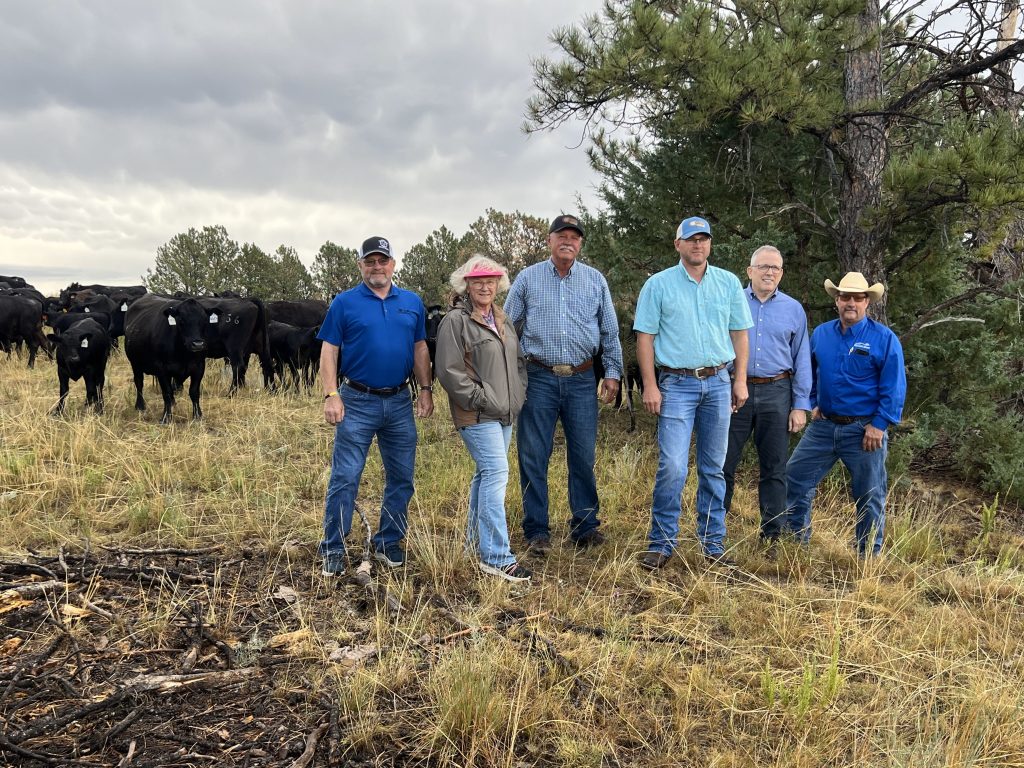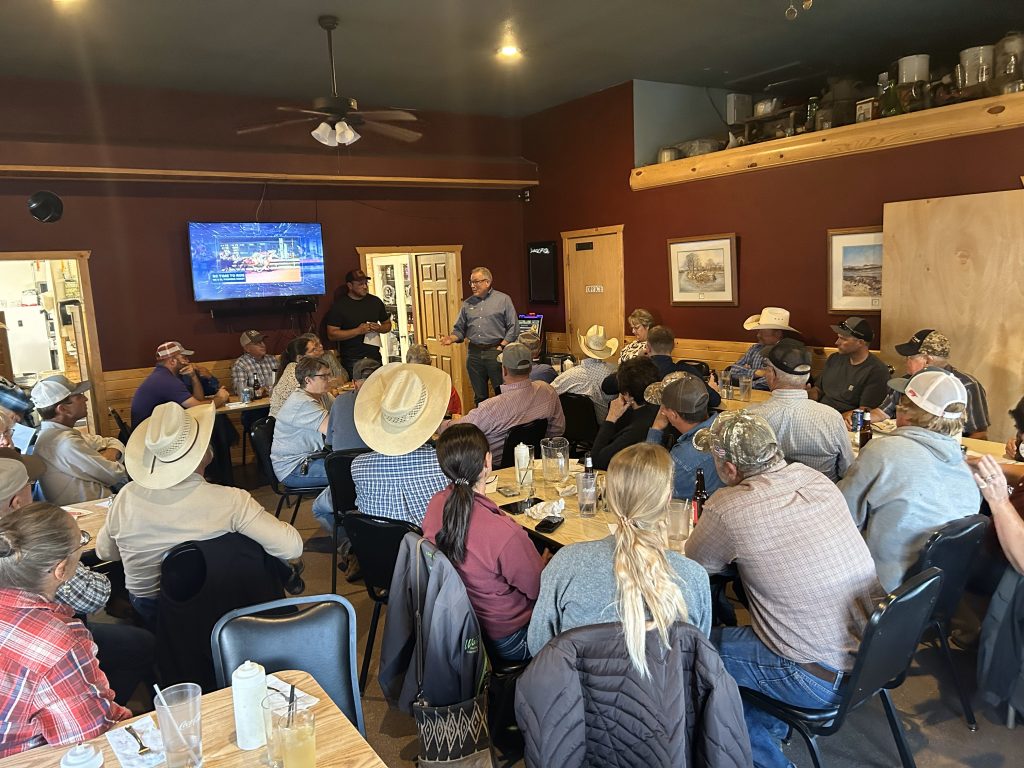Ranchers Weigh in on Farm Bill During National Farmers Union President Visit
By Lura Roti for South Dakota Farmers Union

Tables were packed at a Buffalo restaurant where nearly 50 Harding County ranchers gathered August 26 to discuss pressing agriculture issues with the President of National Farmers Union, Rob Larew.
“It was exciting to have the President of National Farmers Union out here in Harding County so that we could share our way of life and the challenges we face with someone who has influence in D.C.,” said fourth-generation rancher, Joe Painter.
Reinstating mandatory country of origin labeling (MCOOL) topped the list of policy issues Painter and other ranchers discussed with Larew.
“From a cow/calf producer standpoint, reinstating MCOOL would help us get fair prices. We know Farmers Union has been working on this and it sounds like there are more policymakers ready to help,” Painter said.
Larew explained that getting MCOOL into the Farm Bill is the best, if not the only chance there is of getting the labeling law passed. “Because of Senator Rounds (SD) and Senator Tester (MT) support, this is the best possible opportunity we have seen in years,” Larew said.
But getting a Farm Bill passed is a challenge.
The current Farm Bill was passed in 2018. It expired in 2023 and was given a one-year extension by Congress.
“Based on what President Larew shared during the meeting and what we are hearing from others in D.C., the chances of getting a Farm Bill passed this year are small because regardless of upcoming election results, there will be a change of leadership on the Senate Ag Committee,” said Doug Sombke, President of South Dakota Farmers Union.
In addition to the potential for getting MCOOL into the new Farm Bill, ranchers are eager for a new Farm Bill because of the need for updates to risk management and conservation programs they rely upon, explained Oren Lesmeister a Parade rancher, District 28-A State Representative and Farmers Union board member representing the Northwest District.
“Ranchers need a Farm Bill sooner than later,” Lesmeister said. “The current one is old and outdated. In addition to the need for updates, we are concerned that if we don’t get a Farm Bill passed soon, if there are budget cuts, some of the newer programs may be cut or underfunded.”
Existing programs that provide risk protection to cow/calf producers when losses occur due to extreme weather are recent additions to the Farm Bill.
Many ranchers also rely on conservation programs found within the Farm Bill, explained Gary Cammack, a fourth-generation Union Center rancher and Majority Whip of the South Dakota State House.
Since 1984, the Cammack family have utilized USDA cost share programs to help them install miles of waterlines and cross fencing which allow them to implement rotational grazing.
“Without those funds, we probably would not have been able to afford to implement the needed infrastructure, and I know for sure many projects would have had to be delayed for years before we could get them done because of cost,” Cammack said.
To learn how conservation programs work for ranchers, aiding them in rangeland restoration, Larew began his western South Dakota visit with a tour of the Cammack Ranch.
“I have always believed that any time a western South Dakota rancher can share our story and our way of life with someone in a leadership position – especially someone leading a national farm organization – the opportunity should not get wasted,” Cammack said.
Cammack, his wife Amy and their family were recognized in 2018 with the Leopold Conservation Award.
Because Meade County is currently experiencing a drought, Cammack was able to show the positive impact rotational grazing has on grassland health and forage availability – even during a drought.
Larew said learning about how the Cammack family utilized conservation programs from the Farm Bill and seeing this firsthand, provides him with a story he can share during visits with policymakers on Capitol Hill.
“When visiting a ranch like the Cammacks, you see how public dollars are being put to use to enhance habitat for wildlife, improve water quality and soil health. And the importance of Farm Bill programming to be flexible enough to meet the needs of farmers and ranchers where they are because conditions across the country look very different,” Larew explained. “All of the stories I gather while meeting with family farmers and ranchers, will be shared. This is part of what I do because it is the mission of National Farmers Union to make sure the member’s voice is heard.”
The day after meeting with several Harding County ranchers in Buffalo, Larew toured the Painter Ranch. His visit comes just a few weeks after a fire burned 8,000 acres of land in the area.
In addition to losing forage to fire, like their neighbors, the Painters are suffering the impacts of a devastating drought.
“We got an inch of rain a few days ago, and that was the first significant rain we have seen this year,” Cindy Painter said. “To explain how dry things are, this year we were not able to hay 95-percent of our hay ground.”
Joe and Cindy said Larew’s visit to their community and ranch meant a lot to their family. “You hear a lot on the media and it’s tough to know what or who to trust. So, it was nice to hear from someone who actually knows what is going on in D.C,” Cindy said.
Joe added, “from a cow/calf producer standpoint, Farmers Union has been working hard for us, to reinstate COOL and stop monopolies in the packing industry.”
During his visit, Larew also gave an update on the Department of Justice (DOJ) investigation into the possibility of packer monopolies.
“It is significant that the DOJ just opened an agriculture and farming specific anti-trust office in their criminal division in Chicago. This shows they are listening to cattle producers and plan to continue to investigate,” Larew said.
Continuing the conversation in D.C.

In September, some Harding County ranchers will join Larew in D.C. for the National Farmers Union Fly-In. About 40 South Dakota producers will attend this annual event where they get to meet one-on-one with congressional leaders and USDA staff to share their story.
“We are passionate about Farmers Union because of the work this organization does for farmers and ranchers,” said 35-year-old Jason Latham.
Jason ranches with his parents, Darwin and Kay. He and his wife Kaeloni, will be traveling to D.C. for the Fly-In. The Lathams worked with Lesmeister and Karla Hofhenke, Executive Director of South Dakota Farmers Union to organize the western South Dakota tour.
“Working to support our farm and ranch families and getting to meet with them one-on-one during an event like this is the reason I enjoy my job,” Hofhenke said.
Ahead of the meeting, the couple reached out to friends and neighbors, encouraging them to attend the meal and meeting because it would give them an opportunity to get to know Farmers Union better.
“We want our community to know that Farmers Union is working for them. And it is a pretty big deal that the national president made time to visit Harding County,” Jason said. “Most of us out here belong to several agriculture organizations, but very seldom do we get visited by the organization’s national president – if ever.”
During the meal and meeting, Harding County ranchers decided to restart a county Farmers Union organization. Jason was elected President and Kaeloni was elected Secretary.
The young couple have three young children. They said they accepted the nomination to serve because they believe in the work Farmers Union is doing to serve cattle producers like them.

